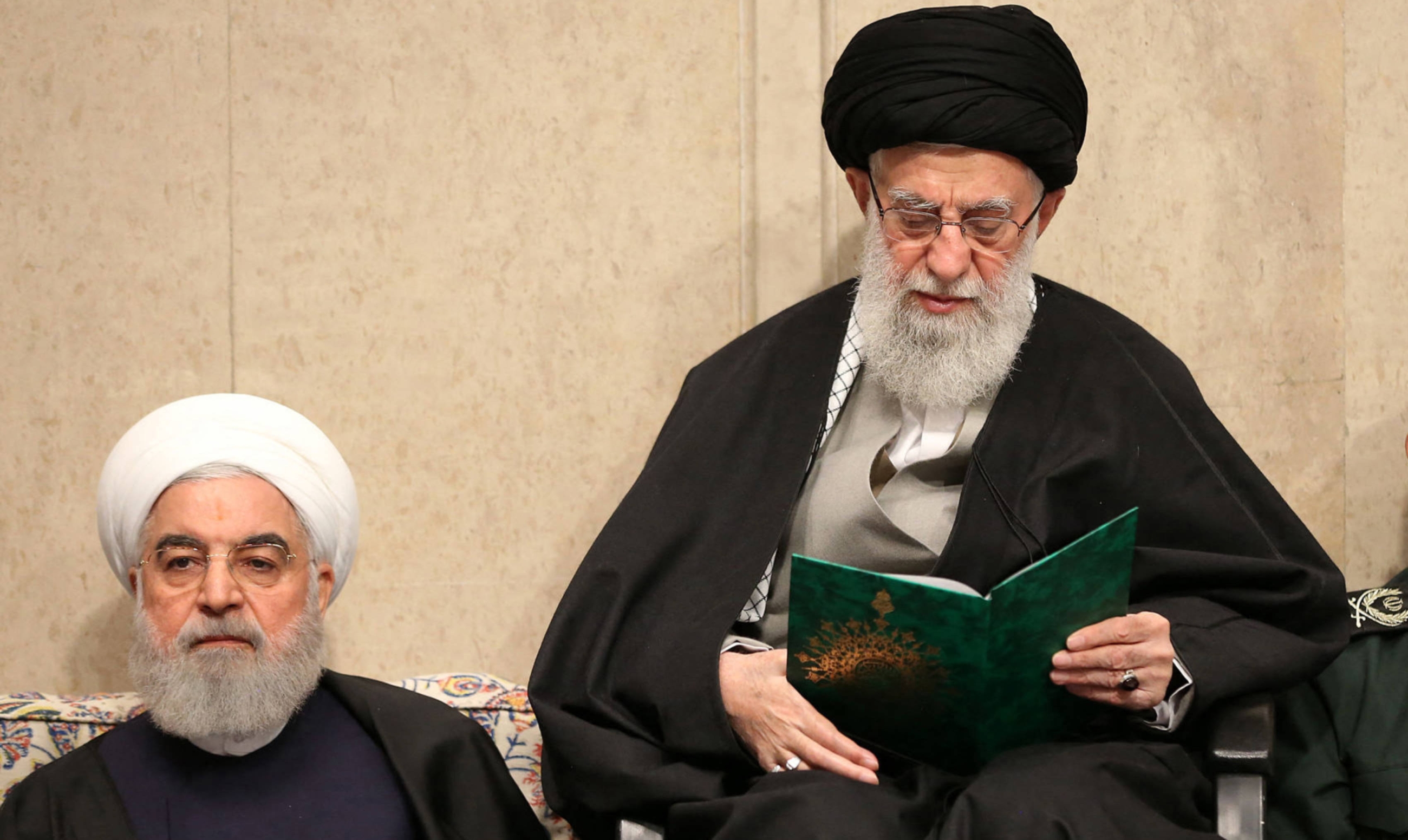Iran: Rouhani’s ban from key assembly unveils power struggle among political elite

Iran's political landscape is undergoing a significant upheaval as former President Hassan Rouhani, along with other moderate candidates, has been unexpectedly disqualified from the upcoming Assembly of Experts' elections.
This assembly, composed of 88 Islamic jurists and clerics, holds the crucial responsibility of supervising the performance of the supreme leader, and plays a pivotal role in electing his successor.
The elections, scheduled for 1 March, have become a hidden battleground to select the person who will succeed Ayatollah Ali Khamenei in becoming the most powerful political and religious authority in the Islamic Republic.
The Guardian Council, responsible for vetting candidates, not only rejected Rouhani but also other prominent moderate figures, including former intelligence minister Mahmoud Alavi.
Even Mostafa Pourmohammadi, a conservative figure who has shifted to a more moderate stance, was also reportedly disqualified.
Stay informed with MEE's newsletters
Sign up to get the latest alerts, insights and analysis, starting with Turkey Unpacked
The council, whose members are directly and indirectly chosen by the supreme leader, wields significant influence in shaping the composition of the Assembly of Experts.
The surprise exclusion of Rouhani and other moderates has brought into focus the internal power struggle within the political establishment regarding the future of the country.
In a statement, Rouhani slammed the council's ruling as "politically biased".
"Why don't you share the reasons for my disqualification with the people?" he said.
'You are not the owner of the revolution and the country. We are saddened by the fact that this revolution is being wasted like this'
– Hassan Rouhani to the Guardian Council
"When some candidates were rejected for supporting Rouhani in the two previous elections, it could have been assumed that they would also reject me."
A low turnout for the upcoming elections is expected, which, according to Rouhani, will favour the ruling conservatives.
"Undoubtedly, the ruling minority overtly seeks to reduce public participation in elections... intending to dictate the people's fate through their decisions," he said.
"You are not the owner of the revolution and the country. We are saddened by the fact that this revolution is being wasted like this."
Khamenei's sons
Speaking to Middle East Eye on condition of anonymity, an establishment insider said that "without any doubt" the order to reject Rouhani came directly from the supreme leader's office, highlighting Khamenei's attempts to keep the assembly within his own circles even after his death.
"The story and fight is over the leader's successor, and the leader's sons, Mostafa and Mojtaba, are, for certain, key competitors," he said.
A former Iranian official told MEE that Mojtaba, despite a previous rise in influence, has seen his power reduced over the past few years as his father discovered some of "his activities", without elaborating on what they were.
The source said that while Khamenei may not be interested in his sons succeeding him, or in "turning the Islamic Republic into a monarchy", both sons have strong allies nonetheless.
The competition for the next supreme leader is a complex interplay involving various political figures, each vying for influence and control. The disqualification of Rouhani, a two-time president, has undoubtedly sparked speculation about the motives behind this move.
The insider suggested that principlists fear figures like Rouhani, who could potentially derail their plans when the crucial moment arrives to choose Khamenei's successor.
The source, who is well informed on behind-the-scenes events, said this strategy echoes past attempts to affect the composition of the assembly.
Eight years ago, Ayatollah Akbar Hashemi Rafsanjani tried to bring Hassan Khomeini, the grandson of the Islamic Republic's founder, into the assembly, but his plan was scuttled when the Guardian Council disqualified him.
Javad Karimi Ghoddouci, a principlist lawmaker, has suggested that Rouhani possesses "the ability and will" to influence the course of leadership succession when the time is right.
This remark aligns with the views of some reformist activists who argue that Rouhani's disqualification stems from the conservatives' anxiety over his potential actions "in the future".
Raisi just a 'scarecrow'
Rouhani's exclusion appears to be a pre-emptive move by principlists to secure their grip on the leadership transition.
Meanwhile, President Ebrahim Raisi, who also serves as the deputy chairman of the Assembly of Experts, is speculated to be among the key candidates for the chairmanship.
However, a former senior conservative editor, who didn't want his name to be revealed, has dismissed Raisi as a mere "scarecrow", positioned strategically by other influential forces within the establishment.
Raisi's role, the editor said, is to divert attention while the actual contenders manoeuvre behind the scenes.
"Raisi is not competent enough to become a leader. I think those who think he will be the leader are deceived," he said.
Last December, a former conservative official told MEE: “The race for replacing Khamenei has already begun and is very heated, and whatever you've seen in Iran in the past two years, and onward, must be analysed in the context of the struggle and fight over the chair of Khamenei."
As the 1 March elections approach, the dynamics within Iran's political establishment are likely to witness further twists and turns, shaping the trajectory of the leadership succession in Tehran.
Middle East Eye delivers independent and unrivalled coverage and analysis of the Middle East, North Africa and beyond. To learn more about republishing this content and the associated fees, please fill out this form. More about MEE can be found here.






